Scouting Importance: Key Benefits for Youth Development and Growth
Updated On: October 23, 2025 by Aaron Connolly
Core Importance of Scouting
Scouting shapes young people into confident citizens through outdoor adventures and character-building activities.
This movement gives lasting benefits to both individuals and their communities by teaching key life skills and values.
Defining Scouting’s Purpose
Scouting exists to help young people become responsible citizens who make a positive impact on society.
The movement focuses on four main aims: character development, citizenship training, leadership skills, and personal fitness.
Character development sits at the heart of everything we do in scouting.
Through outdoor activities and group challenges, scouts pick up honesty, respect, and responsibility.
We use the Scout Method to reach these goals.
This approach blends outdoor activities with informal education.
Camping, hiking, and woodcraft teach practical skills while building confidence.
The Scout Oath and Scout Law guide our actions.
These principles have stuck around for over a century and still help young people make good choices when things get tough.
Scouting programmes shift to match modern needs but keep core values.
We tackle challenges like digital citizenship and environmental awareness, keeping the movement relevant for every new generation.
The Role of Scouts in Society
Scouts stand out as positive role models in their communities.
We encourage young people to get involved and help make society better and safer.
Community service projects show scouts what civic responsibility really means.
These activities might include litter clean-ups or helping elderly neighbours.
Young people start to see how small actions can make a real difference.
Leadership opportunities within scout groups prep members for future roles.
Patrol leaders, troop officers, and event organisers pick up management skills early on.
These experiences build confidence for school, work, and community involvement.
We teach scouts to think critically about social issues.
Topics like environmental conservation, diversity, and community needs become real concerns.
This awareness turns them into engaged citizens who care about their surroundings.
The uniform acts as a visible reminder of scout values.
When young people wear it, they represent the movement’s principles.
That kind of accountability nudges them toward better behaviour and more community involvement.
Benefits at Individual and Community Levels
Individual scouts pick up practical skills that stick for life.
Outdoor abilities like camping and navigation boost self-reliance.
Social skills from group work help scouts build better relationships and work as a team.
Personal benefits include:
- More self-confidence after overcoming challenges
- Better physical fitness through outdoor activities
- Stronger communication skills from group projects
- Academic improvement from developing goal-setting habits
Communities see benefits when scout groups tackle local problems.
Environmental projects spruce up local spaces.
Fundraising events support good causes.
Emergency preparedness training comes in handy during crises.
Scouting creates support networks between families.
Parents often volunteer as leaders and helpers.
These connections strengthen community bonds and spark lasting friendships.
Research shows scouts tend to do better academically and socially than peers.
They show higher civic engagement as adults.
Former scouts often step up as community leaders, teachers, and volunteers.
The movement’s focus on ethics helps create more trustworthy citizens.
Scouts learn to keep promises and help others without expecting rewards.
These values spread through families and friendship circles.
Youth Development Through Scouting
Scouting programmes shape well-rounded young people by meeting their physical, emotional, and social needs at the same time.
This broad approach builds resilience and practical life skills that really last.
Holistic Approach to Personal Growth
Scouting’s biggest strength, in my opinion, is its all-around development model.
Unlike single-focus activities, scouting builds character, leadership, and practical skills together.
Scouts learn outdoor skills like camping and navigation while also developing teamwork.
They earn badges for cooking and first aid, then use these skills on weekend expeditions.
Core development areas include:
- Character building through the Scout Promise and Law
- Leadership opportunities within their patrol or troop
- Practical life skills from basic cooking to budget management
- Community service that builds empathy and civic responsibility
Scouts don’t just learn isolated skills.
They see how personal responsibility links to helping others.
The programme supports gradual progress.
Younger scouts focus on basic skills and cooperation.
Older scouts step into leadership roles and plan activities for the group.
Physical, Emotional, and Social Progress
We know youth development means looking at every side of growth.
Scouting programmes go after physical fitness, emotional intelligence, and social skills.
Physical development comes through hiking, camping, and outdoor challenges.
Scouts build stamina and learn to push their limits safely.
Emotional growth happens through:
- Facing fears during new activities
- Learning from mistakes in supportive settings
- Setting and reaching personal goals
- Gaining self-confidence by mastering skills
Social skills grow naturally during group activities.
Scouts learn to communicate well, solve conflicts, and work as a team.
The mixed-age groups help younger scouts find mentors.
Older scouts develop patience and teaching skills.
These relationships often carry on beyond scouting.
Nurturing Resilience and Coping Skills
We get that resilience doesn’t come from avoiding challenges, but from facing them with support.
Scouting creates safe spaces where young people can tackle manageable difficulties.
Weather challenges on camping trips teach scouts to adapt and solve problems.
They figure out that discomfort is temporary and manageable with the right mindset.
Key resilience-building experiences:
- Navigation challenges that need persistence
- Group projects where compromise is a must
- Service projects that address real community problems
- Leadership responsibilities with real consequences
Adult leaders support scouts so challenges don’t overwhelm them.
Leaders guide instead of rescuing, letting scouts develop true problem-solving skills.
Scouts pick up healthy coping habits through outdoor experiences.
They find that fresh air, physical activity, and supportive friends really help manage stress.
Character Development and Values
Scouting programmes focus on building strong moral foundations through hands-on experiences and structured guidance.
Research shows that young people in scouting improve in trustworthiness, helpfulness, and kindness compared to their peers who aren’t involved.
Building Integrity and Respect
The Scout Oath and Law remind us of core values that shape our choices every day.
Scouts learn to tell the truth even when it’s tough, take responsibility for mistakes, and treat others with dignity—no matter the differences.
Key integrity markers scouts develop:
- Taking responsibility for actions without being asked
- Keeping promises made to peers and leaders
- Admitting mistakes and learning from them
- Standing up for what’s right, even when it’s hard
Tufts University found that scouts showed big gains in trustworthiness over two and a half years.
They measured this with statements like “I can be counted on to tell the truth” and “I take responsibility when I make a mistake.”
Regular meeting attendance makes these values stick.
Scouts who show up consistently report higher trustworthiness than those who drop in occasionally.
The uniform itself reinforces respect and integrity.
When scouts wear it with pride, they’re reminded of the standards they’ve promised to keep.
Fostering Responsibility and Service
Community service projects show scouts their actions can make neighbourhoods better.
We often see young people discover the real satisfaction that comes from helping others without expecting anything in return.
Service opportunities that build responsibility:
- Organising food drives for local charities
- Cleaning up parks and natural areas
- Visiting elderly residents in care homes
- Teaching younger children new skills
Research shows scouts are much more likely to choose “helping others” or “doing the right thing” as their top values.
Non-scouts, on the other hand, often pick “being smart” or “being the best.”
Leadership roles in troops let scouts practise managing real responsibilities.
They plan activities, delegate tasks, and follow through on commitments to their patrol.
Eagle Scouts show long-term commitment to service.
Studies say they keep volunteering, donating to charity, and working to improve their communities well into adulthood.
Emphasising Empathy and Citizenship
Scouting teaches young people to think about how their actions affect others and the wider community.
We watch scouts develop real concern for their friends’ wellbeing and learn to work together, even when they disagree.
Researchers measured kindness with statements like “When my friends are upset, I try to make them feel better.”
Scouts improved in this area, while non-scouts saw no change.
Citizenship skills scouts practise:
- Listening to different viewpoints during patrol discussions
- Compromising to reach group decisions
- Following rules even when leaders aren’t watching
- Understanding how local government affects their community
Camping trips naturally encourage empathy.
Scouts learn to share resources, help struggling teammates, and put group needs ahead of their own comfort.
The international side of scouting exposes young people to different cultures and perspectives.
This broader view helps them become more thoughtful citizens who consider global impacts of local decisions.
Leadership Skills Cultivated by Scouting
Scouting programmes develop leadership abilities through hands-on experiences that push young people to guide others and make tough decisions.
These skills include taking charge, building strong teams, and making ethical choices when it matters.
Opportunities for Leadership Roles
Scouting offers real leadership positions that give young people genuine responsibility.
From patrol leaders to senior scouts, these roles require active decision-making and team management.
Patrol leaders manage groups of 6-8 scouts during activities and camps.
They plan meetings, assign tasks, and solve problems when things go sideways.
This teaches them to delegate and motivate others.
Senior scouts often mentor younger members and lead training sessions.
They learn to adapt their communication style for different age groups.
This builds confidence in public speaking and instruction.
During camping trips, scouts rotate leadership duties for navigation, cooking, and safety.
Everyone gets a shot at making quick decisions that affect the whole group.
These experiences teach them to stay calm under pressure.
The Youth Leadership Training programme in Trinidad and Tobago shows how these roles work in practice.
Participants led real projects and guided their peers through challenges.
They gained confidence by actually doing the work, not just sitting through theory.
Collaborative Teamwork Skills
Scouts learn that effective leadership means working with people, not just bossing them around.
Activities like rope courses and orienteering need everyone to pitch in with their strengths.
Group projects teach scouts to listen to different ideas before deciding.
They practise active listening and start to value input from quieter team members.
This creates an environment where everyone feels heard.
Communication skills grow through regular patrol meetings and planning sessions.
Scouts learn to explain ideas clearly and ask smart questions.
They also figure out how to give feedback without hurting feelings.
Problem-solving activities force teams to blend different skills and perspectives.
One scout may be great at map reading, another at managing equipment.
Leaders spot these strengths and assign roles that fit.
Merit badge requirements often involve group work over several weeks.
Scouts must coordinate schedules, share responsibilities, and support struggling teammates.
These experiences teach patience and compromise.
Ethical Decision-Making in Practice
Scouting’s values-based approach helps young people make good choices, even when things get tricky.
The Scout Promise and Law offer a framework for ethical decision-making.
Service projects put ethical leadership to the test.
Scouts balance community needs with available resources and volunteer energy.
They learn to make fair decisions that help the most people possible.
During outdoor adventures, scouts face real moral dilemmas.
Should they help a struggling team member even if it slows everyone down?
How do they handle someone who’s not following safety rules?
These moments teach empathy and responsibility.
The focus on service-oriented leadership means scouts learn to put others first.
They discover that true leaders serve their communities, not just themselves.
This builds character and lasting values.
Environmental stewardship activities teach scouts to think about long-term consequences.
They learn to balance what they want now with what’s best for the future.
This develops strategic thinking and responsibility for others.
Regular reflection sessions let scouts look back on their choices and learn from mistakes.
They talk about what went well and what they’d change next time.
That kind of self-awareness sets the stage for lifelong growth.
The Power of Non-Formal Education
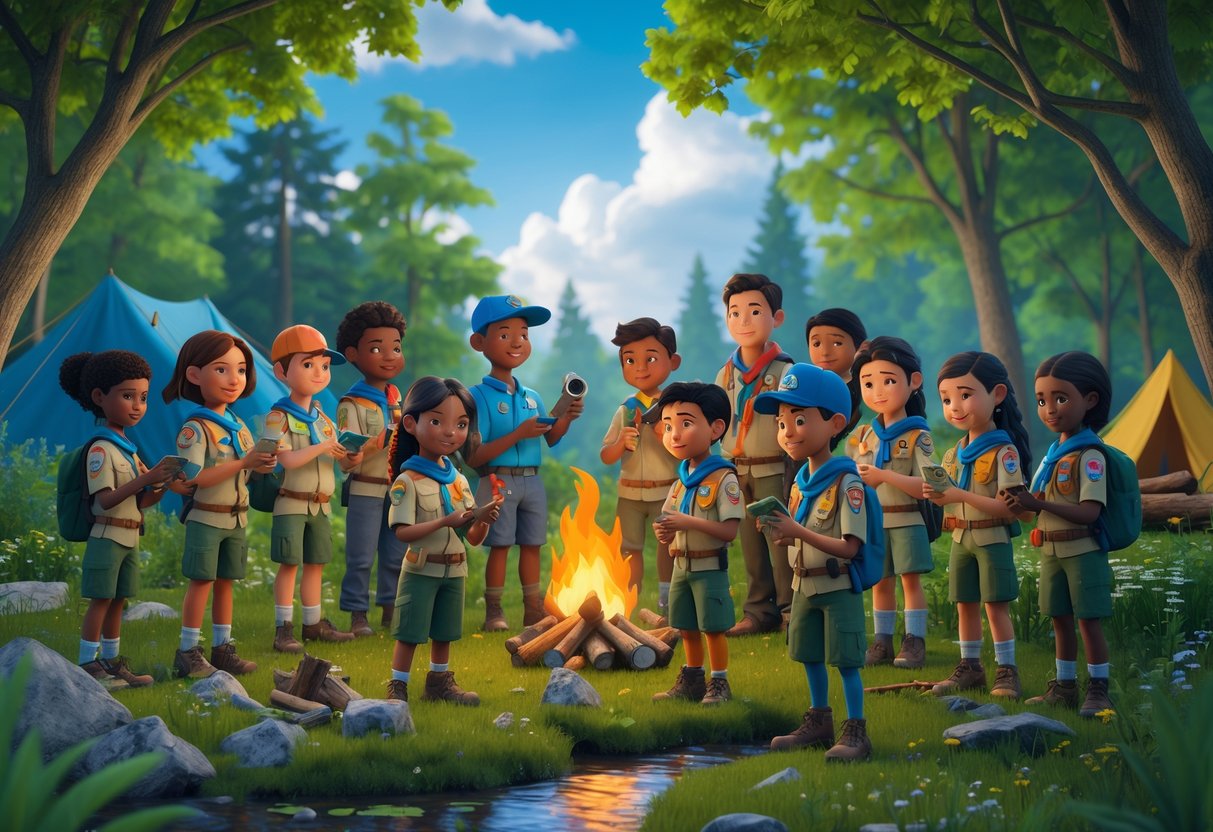
Scouting throws out the textbooks and dives straight into real experiences. Young people pick up skills through outdoor challenges and make friendships that stretch way beyond the classroom.
Experiential and Active Learning
Non-formal education puts action before theory. Scouts get their hands dirty instead of sitting through lectures.
When we teach knot-tying, we hand over real rope. Fire-starting? Scouts strike actual matches and work with kindling. First aid becomes a hands-on practice with bandages and mock scenarios.
This style helps information stick. Studies say people remember:
- 10% of what they read
- 20% of what they hear
- 90% of what they do
Scouts apply what they learn right away. Someone who learns map reading on Saturday will probably use those skills on Sunday’s hike. Navigation turns into muscle memory, not just a theory lesson.
The Scout Method leans into this. Young people steer their own growth through real experiences. They mess up sometimes, but that’s how they learn.
Outdoor Activities and Challenges
Nature isn’t just a backdrop in Scouting—it’s the classroom. We take learning outside, where young people meet real challenges.
Rock climbing grows confidence and sharpens problem-solving. Camping teaches planning and resilience. Hiking builds fitness and teamwork.
These activities create memorable learning moments. Lighting a fire in the rain? That’s a practical skill and a serious confidence boost.
Outdoor challenges scale with age:
- Beavers (6-8): Nature walks and simple games
- Cubs (8-10.5): Basic camping and orienteering
- Scouts (10.5-14): Multi-day expeditions and adventure sports
The outdoors never runs out of lessons. Weather changes, plans go sideways, and Scouts have to adapt. When gear fails, they get creative.
Social Interaction Beyond the Classroom
Scouting brings together young people from all kinds of backgrounds and ages. They pick up social skills by sharing real experiences.
Mixed-age groups mean younger Scouts learn from older ones. Leadership just sort of happens—experienced members step up and guide the rest.
Patrol systems make social learning real. Teams of 6-8 Scouts tackle projects together. They plan, solve problems, and have each other’s backs.
These bonds can last a lifetime. Lots of adult leaders started out as Scouts and return to give back.
Scouting mixes kids who might never cross paths at school. Different schools, neighborhoods, and social circles come together. That diversity builds communication skills and helps everyone understand each other a little better.
Scouting in the Context of Formal Education
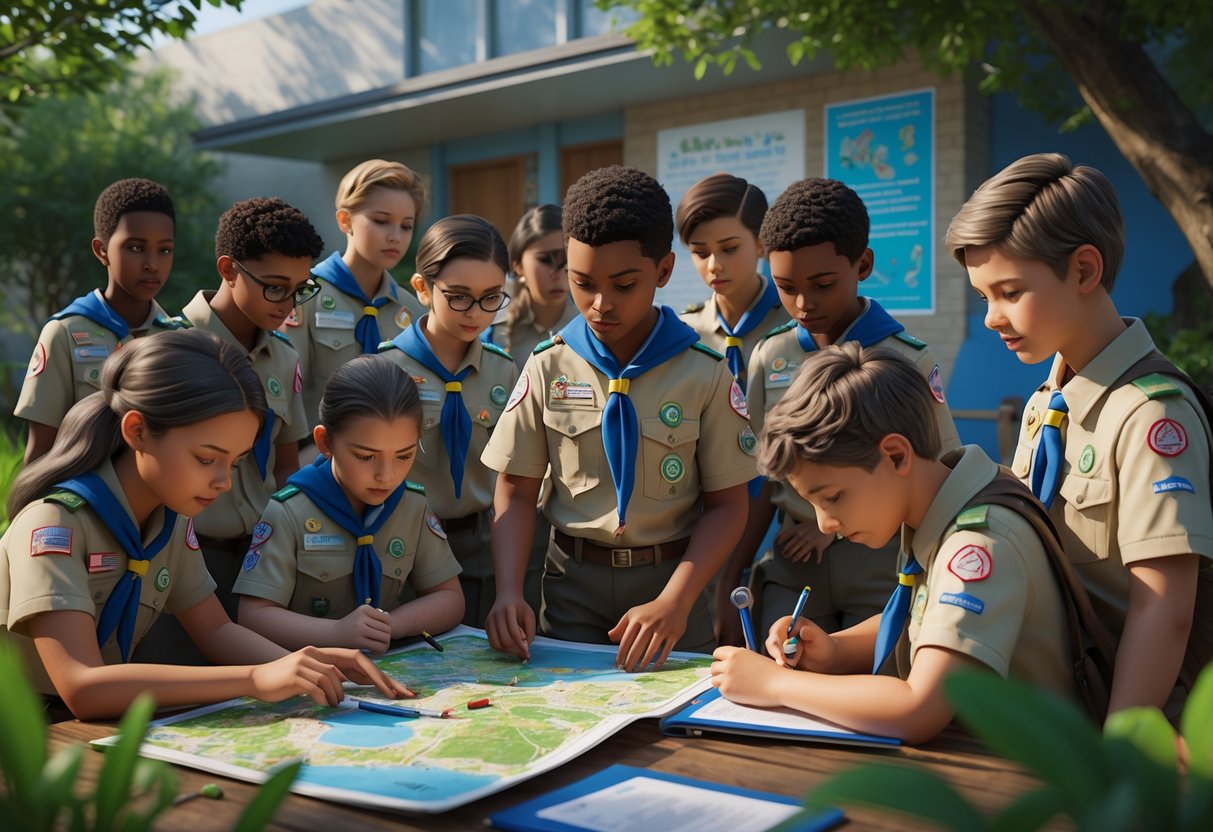
Scouting works with schools to boost learning and support student success. Studies show Scouting helps develop academic skills while teaching leadership and citizenship—areas that schools can’t always cover.
Supporting Academic Achievement
Schools across the UK notice that students who join Scouting often do better academically. The program builds skills that show up in the classroom.
Scouting helps students with planning and preparation. Young people learn to set goals and break them into steps.
Leadership training in Scouting turns students into more confident speakers. That confidence comes through in school presentations and group work.
Baylor University’s research found Eagle Scouts are more likely to:
- Set goals and plan ahead
- Connect well with others
- Take on leadership roles in their communities
- Build stronger family and friend relationships
Problem-solving activities in Scouting teach young people to think outside the box. These skills help them with tough subjects like math and science.
Many schools now team up with Scout groups. They see students bringing organization, teamwork, and leadership back to class.
Complementing School Curricula
Scouting covers ground that schools sometimes miss. While schools focus on academics, Scouting teaches life skills through hands-on activities.
Outdoor education programs teach navigation, camping, and first aid. These give young people the confidence to handle real-life situations.
The Scout method uses experience to help students apply what they learn at school. Science lessons make more sense when Scouts use them on a camping trip.
Citizenship training in Scouting isn’t just theory. Young people roll up their sleeves and get involved in community projects.
Where Scouting helps school learning:
- Character development through real challenges
- Leadership chances you just don’t get in a classroom
- Practical use of academic knowledge
- Social skills in mixed-age groups
Teachers often say Scout members are more engaged. They bring energy and real-world experience to classroom discussions.
The non-formal approach in Scouting creates active, solution-focused citizens. That mindset helps young people thrive in school and beyond.
Building Decision-Making Abilities

Scouting helps young people make smart choices under pressure by throwing them into hands-on problem solving and encouraging calculated risk-taking. Scouts learn to think clearly in tough moments and trust their own judgment.
Problem Solving in Real-Life Situations
Scouting puts young people right in the middle of situations where they have to think quickly and find solutions. On a camping trip, Scouts might deal with sudden storms, broken gear, or getting lost.
These challenges teach Scouts to stay calm and work through problems one step at a time. They gather facts, weigh options, and pick the best path forward.
Typical problem-solving moments in Scouting:
- Finding shelter when tents collapse in bad weather
- Rerouting when trails are blocked
- Dividing up limited food fairly
- Fixing gear with basic tools and a little creativity
Orienteering forces Scouts to read maps, use compasses, and make quick decisions about which way to go. They get faster at processing information and making choices under pressure.
These skills spill over into school projects, family life, and future jobs. Scouts realize most problems have more than one solution, and creative thinking pays off.
Risk Assessment and Taking Initiative
Scouts learn to weigh risks before jumping in. During rock climbing or river crossings, they check for danger and decide if it’s safe to go ahead.
This training teaches Scouts to gather facts, think about possible outcomes, and make smart choices—not just act on impulse. They figure out when to push forward and when to hold back.
Risk assessment skills Scouts pick up:
- Checking the weather before heading out
- Testing gear before trusting it
- Judging team members’ skills for different tasks
- Knowing when to ask leaders for help
Scouts also learn to take initiative. They step up to lead, organize events, and solve problems without waiting for someone to tell them what to do.
This builds real confidence. Scouts see that decision-making gets easier with practice, and that messing up sometimes is just part of learning.
Communication Skills for Life
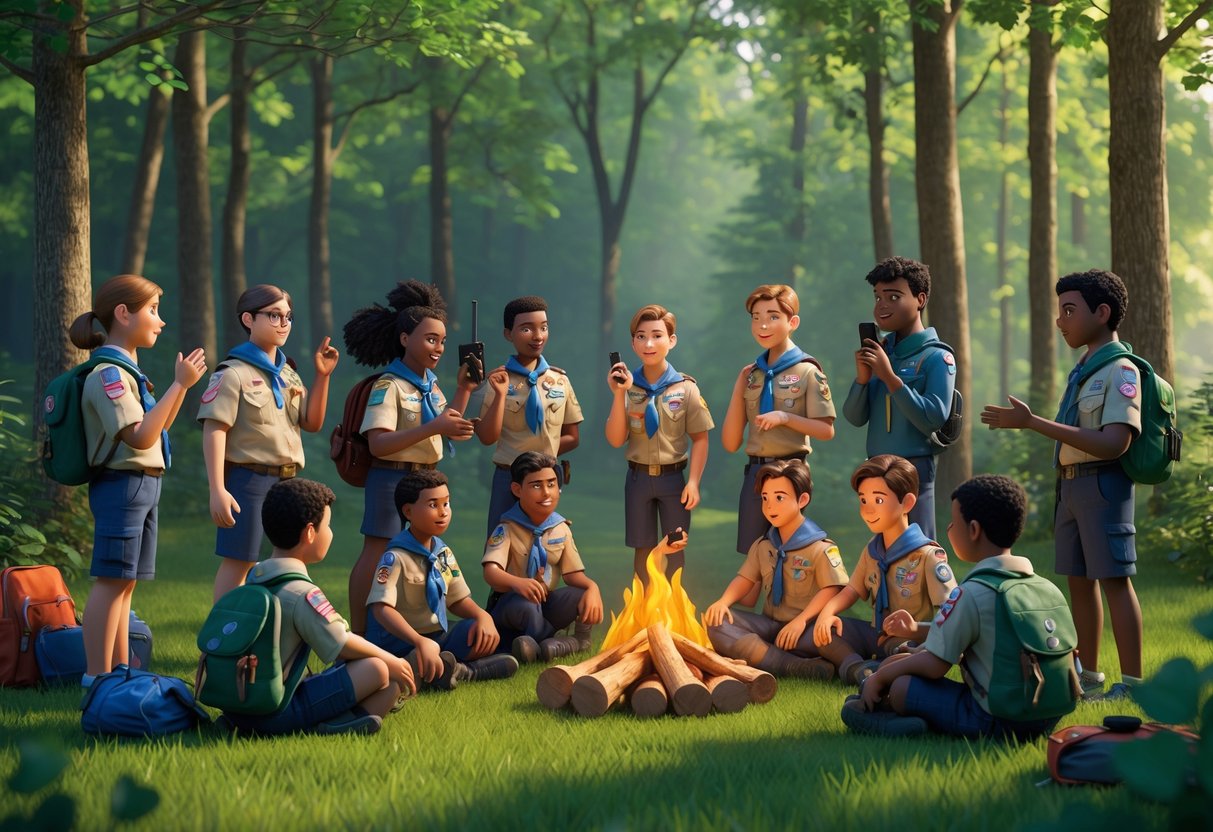
Scouting shows young people how to express themselves and really listen to others. These skills help Scouts handle disagreements and build stronger relationships all through life.
Developing Verbal and Non-Verbal Communication
Communication sits at the heart of every Scout activity. When Scouts team up for patrol duties or plan trips, they learn to share ideas and listen to different points of view.
Verbal skills grow through giving presentations, leading meetings, and explaining things to younger Scouts. You see Scouts get braver about speaking up during troop talks. They practice explaining badge requirements or swapping stories around the fire.
Non-verbal communication matters too. Scouts get good at reading body language during group tasks. They notice when teammates feel frustrated or excited. Hand signals come in handy during quiet moments in the woods.
Active listening gets better with Scout training. Young people learn to focus on what others say instead of just waiting for their turn. This skill helps during meetings and when things get tense.
The communication merit badge covers things like:
- Public speaking basics
- Interview skills for jobs
- Written communication for reports and letters
- Digital etiquette for emails and texts
These skills transfer easily to school, job interviews, and family life.
Enhancing Conflict Resolution Abilities
Scouts learn to handle disagreements without letting tempers flare. When patrol members clash over menus or hiking routes, they use steps to find solutions everyone can live with.
Problem-solving starts with figuring out the real issue. We coach Scouts to separate facts from feelings. They ask questions like, “What do we all want out of this?” instead of pointing fingers.
Compromise skills come naturally in Scouting. Whether picking service projects or campfire activities, Scouts get used to finding middle ground. They realize the best solutions often mix everyone’s ideas.
De-escalation helps when things get heated. Scouts learn to:
- Lower their voices if others get loud
- Take a break when talks go nowhere
- Acknowledge feelings before tackling the problem
- Focus on shared goals instead of personal differences
Peer mediation becomes a real tool. Older Scouts help younger ones settle disputes fairly. This builds leadership and empathy—skills that matter in school and later on the job.
These conflict skills prepare Scouts for the real world—workplaces, families, and community life.
Fostering Independence and Self-Esteem
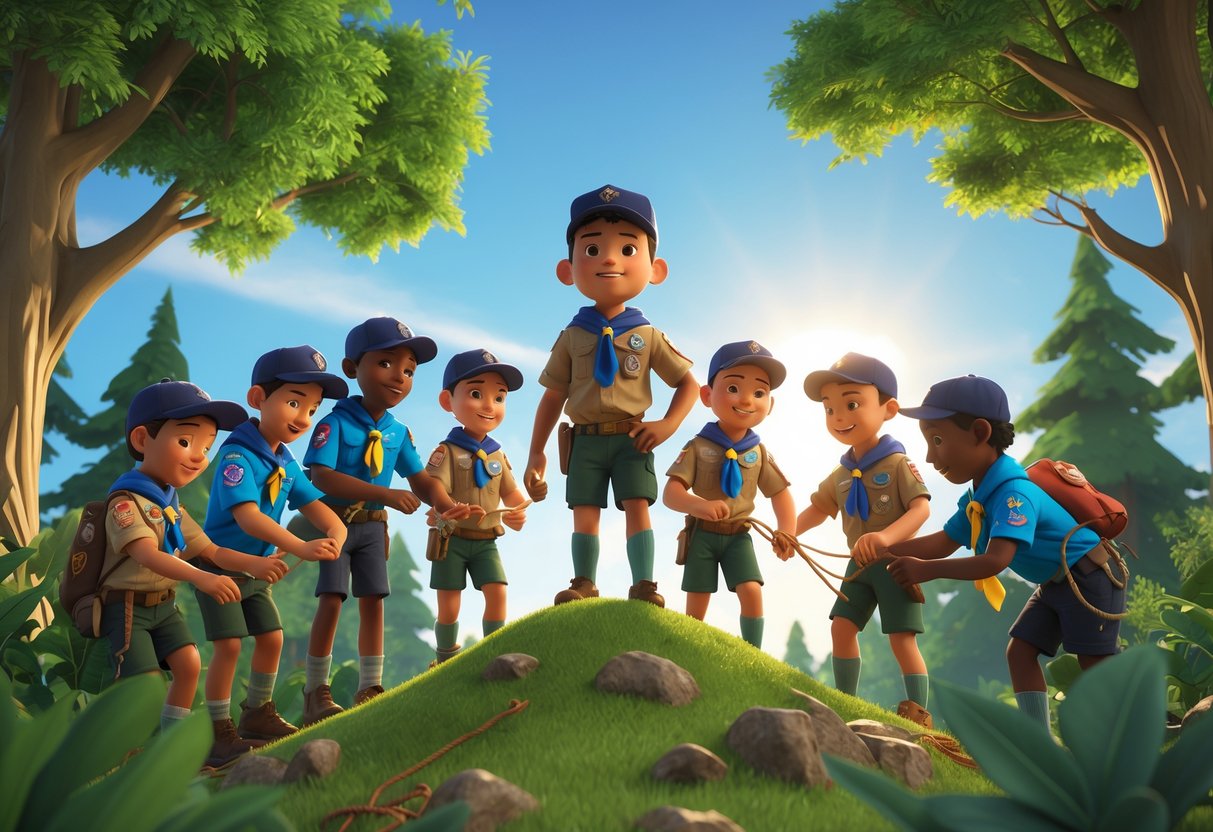
Scouting boosts young people’s confidence with hands-on challenges that build self-reliance. Scouts discover what they can do, and that self-esteem sticks with them.
Encouraging Self-Reliance
Scouting activities nudge young people out of their comfort zones, but in a safe way. When Scouts navigate with just a compass, pitch their own tents, or plan group meals, they start trusting their own judgment.
The outdoors plays a big part in growing independence. Away from home, Scouts rely on themselves and their teammates to get through challenges.
Key activities for independence:
- Map reading and navigation
- Cooking meals without adults
- Managing personal gear
- Leading younger Scouts
Studies show Scouts develop stronger self-reliance than their peers. The step-by-step system means each win builds confidence for the next challenge.
This gradual increase in responsibility helps young people see their own growth. They learn that mistakes are part of the process—not something to worry about.
Building Confidence Through Achievement
The badge system in Scouting sets out clear goals. Each badge is proof of a new skill or challenge overcome.
Studies with 430 secondary students found Scouts had better conflict resolution skills than non-Scouts. That comes from working together—Scouts have to team up to succeed.
Milestones that boost confidence:
- Earning badges for favorite activities
- Completing challenge badges on a deadline
- Taking on leadership roles
- Representing their group at district events
The advancement system encourages setting goals and sticking with them. Scouts see that effort pays off, and that mindset sticks with them for life.
Recognition ceremonies make achievements public. When peers and leaders celebrate their progress, young people feel proud and motivated to take on bigger challenges.
Adventure, Fun, and Personal Satisfaction
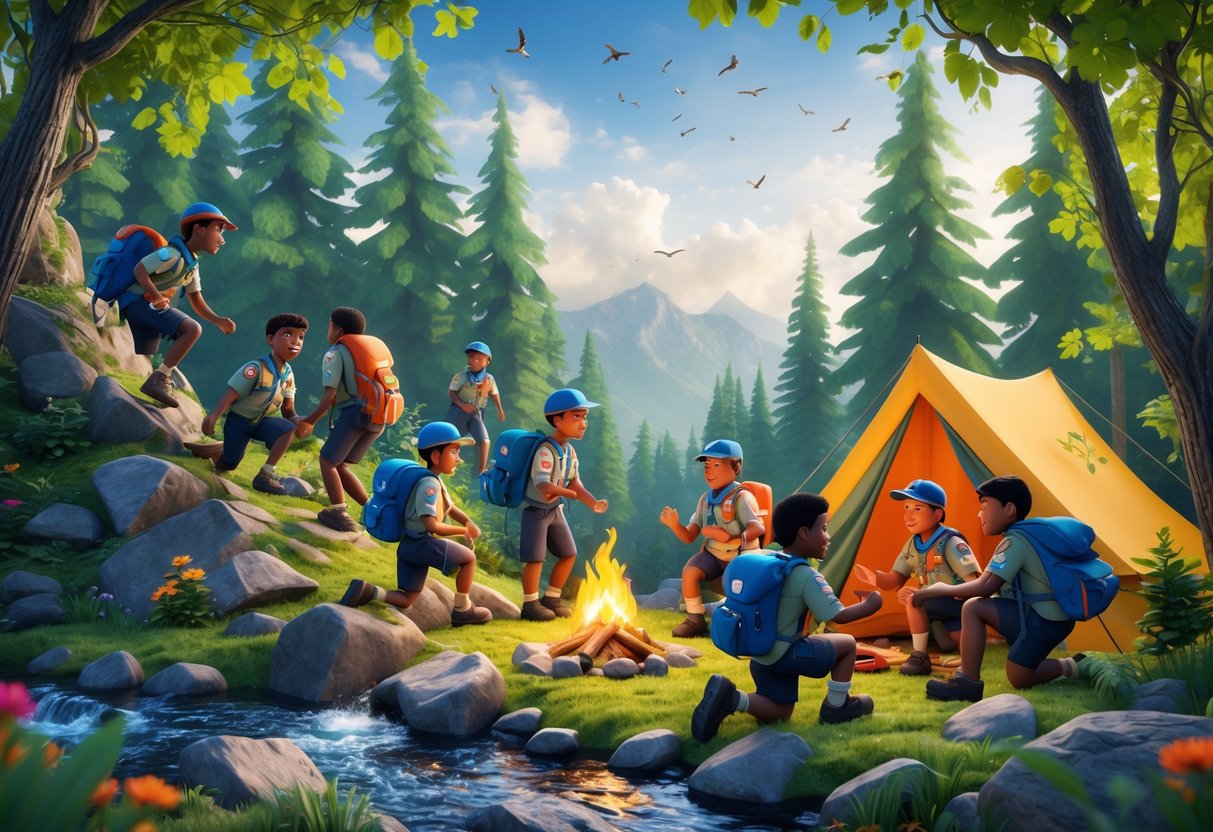
Scouting turns ordinary weekends into outdoor adventures packed with fun and lasting memories. Young people pick up new skills and build friendships that often last for years.
The Thrill of Outdoor Exploration
Scouts dive into adventures that most kids just don’t get at school or at home. They pitch tents in the rain, figure out maps and compasses, and light campfires from nothing but sticks and determination.
Outdoor skills scouts pick up:
- Hiking and orienteering
- Camping and survival basics
- Spotting wildlife
- Rock climbing and water sports
Scouts learn these things out in the real world, not in some indoor center. One day they might paddle down a river, the next they’re scrambling up a mountain or sleeping under the stars for a whole week.
All that excitement? It comes from tackling stuff they once thought was out of reach. Picture a scout who’s terrified of heights—by the end of camp, they might actually abseil down a cliff.
Physical benefits show up quick—better fitness, coordination, stamina. A lot of scouts realize they love moving around outdoors way more than sitting inside.
As scouts get older, the adventures ramp up. Little ones might just explore the local woods, but the older scouts? They’re planning international trips or multi-day hikes.
Lifelong Friendships and Memories
Scout groups bond over shared experiences in a way classroom friendships rarely do. Working together to pitch camp or solve outdoor puzzles builds trust almost instantly.
Friendship-building activities:
- Team challenges and problem-solving games
- Sharing tents and cooking for each other
- Stories and songs around the campfire
- Helping each other through tough moments
These friendships stick because they’re forged in real moments. Scouts never forget the friend who comforted them when they felt homesick that first night away.
Group adventures lead to inside jokes and stories that resurface years later. Adults often light up when they talk about memories from scout camps decades ago.
Social skills grow naturally in group living. Scouts figure out how to settle arguments, share gear, and get along with all sorts of personalities.
The memories stick, too. Surviving a week in the wild or finishing a tough hike can boost your confidence for years.
Impact of Scouting at a Global Level

Scouting brings together 57 million young people across 176 countries. It’s actually one of the biggest youth movements out there. This network builds friendships across borders and gets everyone tackling big issues like environmental protection and community service.
International Community and Unity
Scouting forges connections between young people from all over the world. Through international camps, exchanges, and joint projects, scouts discover new cultures and ways of life. They learn to respect differences and form friendships that sometimes last forever.
World Scout Jamborees gather thousands of scouts every four years. These huge events let people swap traditions and pick up new skills together. A lot of scouts call these gatherings life-changing.
The World Organization of the Scout Movement (WOSM) coordinates activities for all its member countries. This setup keeps scouts everywhere focused on values like respect, teamwork, and service. Local groups even partner up with troops from other countries.
Now, scouts use video calls and social media to keep those international friendships alive. They team up to tackle global problems—climate change, poverty, you name it.
These connections push scouts to think past their own neighborhoods. They start to see the world differently and grow into more open-minded citizens.
Contributing to a Better World
Scouts get their hands dirty solving real problems in their communities. The Scouts for SDGs programme gets young people working towards the United Nations’ Sustainable Development Goals. Projects cover everything from clean water to education and protecting the environment.
Environmental action is a huge part of scouting’s impact. Groups plant trees, clean up rivers, and run recycling drives. Plenty of scouts even go on to work in environmental science or conservation.
Community service projects can mean anything from helping elderly neighbors to building schools overseas. Scouts see firsthand that small actions add up. They start to feel responsible for making their world a better place.
Research suggests these experiences shape more active citizens. Former scouts often volunteer, vote, and step up as leaders in their communities. They carry those scouting values into whatever they do next.
When millions of young people focus on the same issues, they can make a real difference.
Frequently Asked Questions

Parents, young people, and community leaders usually ask the same questions about how scouting works and what it offers. These questions range from educational advantages to personal growth.
What are the top benefits young people gain from participating in scouting?
Scouting gives young people skills you just can’t pick up anywhere else. Scouts grow as leaders, learn outdoor survival skills, and become better problem-solvers through hands-on activities.
We teach practical life stuff—first aid, cooking, managing money. Scouts also get comfortable talking to adults and presenting to groups.
A lot of scouts surprise themselves by handling challenges they never thought possible. They build self-confidence through trips, service projects, and working towards new ranks.
In what ways does scouting contribute to a child’s education in schools?
Scouts often do better in school because they pick up time management and responsibility while working on badges. The program teaches research skills and how to finish projects, which helps with homework.
Many scouts say they feel more at ease speaking up in class or joining group projects. They learn to work as a team and sometimes even lead activities at school.
Outdoor education gives scouts real-world knowledge that ties into science, geography, and environmental studies. Honestly, it can make classroom subjects way more interesting.
How does scouting play a role in personal development?
Scouting focuses on strong moral values through the Scout Law and Scout Oath. We try to build character traits like honesty, loyalty, and helpfulness in everyday life.
Scouts often step out of their comfort zones in a safe way. Maybe they try rock climbing, public speaking, or leading younger scouts for the first time.
They learn to set goals and work towards them. That habit sticks with them in school, sports, and beyond.
Could you outline the primary aims that guide the scouting movement?
Scouting wants to help young people grow into responsible citizens and leaders. We aim to build character, teach practical skills, and encourage service.
The movement supports scouts in reaching their potential—physically, mentally, and spiritually. We offer adventure and personal growth in a safe, supportive place.
We’re hoping to raise young adults who can solve problems, work with others, and make good decisions. Scouts should leave ready to make their communities better.
Which methods are typically employed in scouting to achieve its objectives?
We use outdoor activities like camping, hiking, and survival skills to teach independence. These hands-on experiences stick with you and build real confidence.
The patrol system puts scouts into small groups, so they learn teamwork and leadership naturally. Older scouts help the younger ones, and everyone learns together.
Badge work and rank advancement give scouts something to aim for. This system rewards effort and teaches new skills along the way.
What is the overarching purpose of scouting activities for youngsters?
Scouting helps young people grow into the best versions of themselves. We offer experiences that build confidence and teach important values.
Kids in scouts get the chance to serve their communities. They start to see what it means to be a responsible citizen.
We want them to make a real difference in the world around them. Scouting helps them learn skills and develop friendships that last.
Our goal? We’re getting young people ready for adult life. We want them to leave scouting with the confidence and tools to handle whatever comes next.

